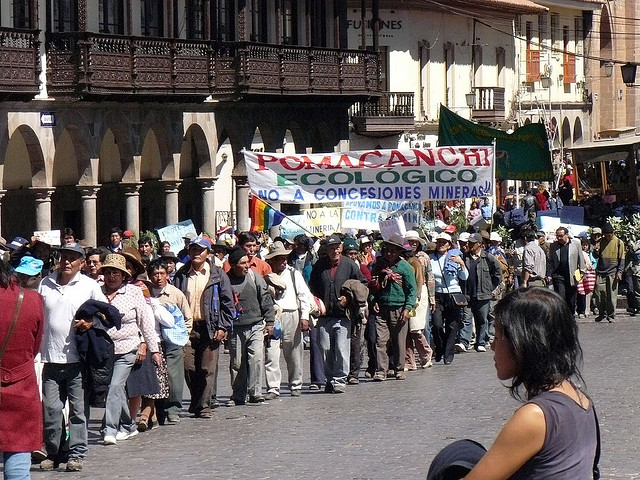This summer Peru’s government legalized police repression against protesters, effectively giving police a license to kill people for defending their access to a safe environment. This chilling law was aimed at Indigenous resistance against open-pit gold mining and other extraction projects in Peru, where police violence has incited deadly conflict in the past.
So far, it seems no connections have been made between the new law and the civil society protests that can be expected around the upcoming COP20 negotiations. This is for good reason — they’re unlikely to be enforced on efforts involving mainly residents of Lima and international visitors. According to the U.K.-based Peru Support Group, the government has been gradually criminalizing social protest since 2006, with the main target being those involved in resistance against large-scale extractive projects that threaten the environment.
While I’m glad that mobilization of civil society at COP20 seems set to go ahead without police repression — which hasn’t always been the case at past COPs — this is a stark contrast to the treatment of local organizers resisting these polluting extraction projects, who can expect to be subjected to criminal investigation, or worse. While it has attracted more attention in Peruvian media, it needs to be highlighted internationally, and while carrying out the rest of our work at COP20 I hope to find some way to act in solidarity with the local organizers facing these threats.
This crackdown and surveillance of environmental organizers combined with a recent stripping of environmental protection laws in order to speed oil and mining development is all too familiar to the Canadian trajectory in recent years.
In Canada we have seen police violence break out around First Nations protests against fracking in their territories. We have seen environmental and social justice NGOs targeted by tax audits that drain their resources and have led to some giving up or being stripped of their charitable status. Many of these same groups have been put under surveillance by the RCMP — with a focus on Indigenous efforts to resist extraction projects. Last month I was shocked to see on the list of monitored events not just the names of high-profile protests like Montreal’s March Against Missing and Murdered Indigenous Women and the Defend Our Climate Actions last October, but also events as inconspicuous as a small workshop on divestment held by the CYCC at my university. All of this has occurred alongside the omnibus bills that have stripped Canada of much of the environmental protection legislation that has been introduced in the past 30 years.
There are obvious limits to any direct comparison of Peru and Canada, for one because our wealth and relative privilege on the global scale make these actions that much more deplorable on our government’s part. Adding to this is the fact that the Canadian government has also been actively working against climate and environmental progress far outside of its borders in the name of economic benefits, promoting its oil sands at global meetings instead of working on climate policy. Canadian mining projects in Peru with clear environmental and health risks have been actively promoted by Harper, and our government has gone so far as making much of our foreign aid in the country contingent on partnership projects with our mining corporations.
What makes this all a little easier to swallow is the momentum of all the communities working in the face of some of this repression. In the past few months in Canada alone, we have had a landmark ruling this summer recognizing the right of the Tsilhqot’in Nation to manage over 1,750 kilometres of their unceded land and a fracking ban in Nova Scotia that was hard-fought by front-line communities.
In Peru, a coalition of organizations known as GrupoPeru is working to organize a strong civil society presence at COP20, young organizers are working to make a meeting of youth delegations happen at COY10, and the ongoing resistance efforts of Indigenous and non-Indigenous communities directly affected by the mining in Peru show no signs of letting out.
In solidarity with Peruvian organizers and our own front-line Indigenous communities, who continue to bear the worst effects of these steps away from climate progress, I am excited to try to shed light on some of the ways our governments are failing us and spur change for the better at COP20 this December.
Photo: jhf/flickr



